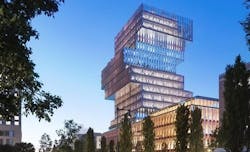Boston University hires Schneider Electric to manage new Computing Center’s Net-Zero profile
The Boston University Center for Computing and Data Sciences in Massachusetts has selected energy management and automation specialist Schneider Electric as its sustainability partner.
The new education center is the largest net-zero building in Boston and sets a new standard for sustainable, all-electric buildings in the city, Schneider says. To heat and cool the 345,000 square-foot complex, Boston University will utilize 31 geothermal wells, and procure all of its electricity through a long-term power purchase contract with a wind farm in South Dakota.
Schneider’s EcoStruxure Building Offering will serve as the building management system, supported by EcoStruxure Building Advisor’s Fault Detection and Diagnostics platform for continuous commissioning. These systems will enable building management to monitor and regulate energy consumption throughout the building closely.
The Building Emissions Reduction and Disclosure Ordinance (BERDO) in Boston mandates that all large buildings must gradually decrease their emissions to achieve net-zero operations by 2050. However, Boston University has set its own climate targets through its Climate Action Plan, which goes beyond the city’s goals and aims for net carbon neutrality by 2040.
“Organizations in Boston and around the country are under immense pressure to reduce their carbon emissions as part of broader climate action plans, however, developing and executing sustainable building construction and operation plans can be daunting,” said Estelle Monod, Buildings Segment President, Schneider Electric. “Boston University has proven to be a leader in this space, and Schneider Electric is proud to leverage our expertise and market-leading technology to help the university and other customers execute their sustainability missions.”
Related stories from EnergyTech
Free Webinar: What's Cooking with Bimbo Bakeries USA. Featuring Schneider Electric & GreenStruxure
Choice Hotels International connects with AI-based EcoStruxure to monitor Energy use at 6,000 hotels
See our latest EnergyTech ENL with C&I Energy Transition insights on Pharma and Food companies
“Schneider Electric has proven to be an invaluable partner in the developing our university’s first true net zero building, and we’re proud to serve as an example of what’s possible for the rest of the city,” said Elijah Ercolino, Executive Director of Planned Maintenance & Engineering, Boston University. “Not only will the new Center for Computing and Data Sciences serve as a vital resource for students, but the building’s geothermal system is demonstrating the strategy for decarbonizing building operations.”
During construction, crews bore holes and fit pipes so the campus can be supplied with about 300 tons of ground-source heating and cooling capacity. The installed heat pumps were designed to deliver about 90 percent of the facility’s needs.
KPMB was the architectural contractor on design for the new Boston University building.
About the Author
EnergyTech Staff
Rod Walton is head of content for EnergyTech.com. He has spent 17 years covering the energy industry as a newspaper and trade journalist.
Walton formerly was energy writer and business editor at the Tulsa World. Later, he spent six years covering the electricity power sector for Pennwell and Clarion Events. He joined Endeavor and EnergyTech in November 2021.
He can be reached at [email protected].
EnergyTech is focused on the mission critical and large-scale energy users and their sustainability and resiliency goals. These include the commercial and industrial sectors, as well as the military, universities, data centers and microgrids.
Many large-scale energy users such as Fortune 500 companies, and mission-critical users such as military bases, universities, healthcare facilities, public safety and data centers, shifting their energy priorities to reach net-zero carbon goals within the coming decades. These include plans for renewable energy power purchase agreements, but also on-site resiliency projects such as microgrids, combined heat and power, rooftop solar, energy storage, digitalization and building efficiency upgrades.
